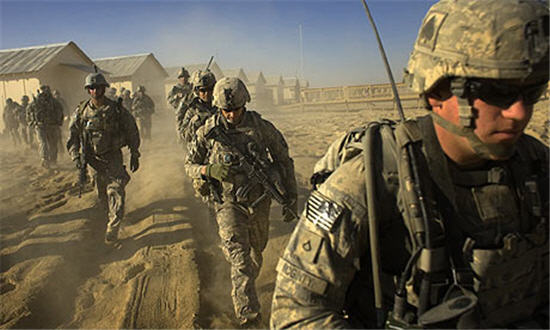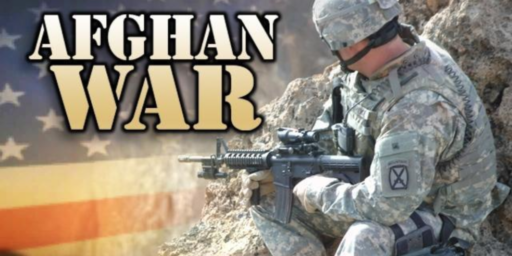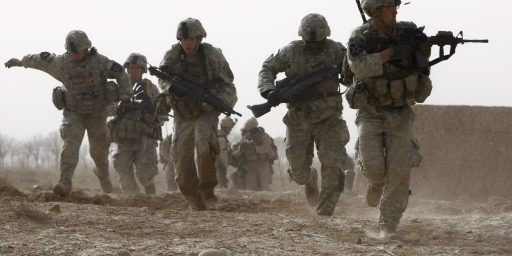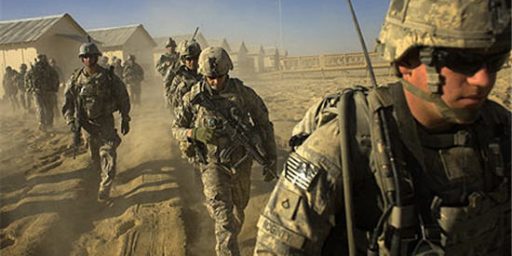U.S. Deaths In Afghanistan Hit 2,000
We passed another grim milestone in the Afghanistan War today with a “Green On Blue” attack that led to the 2,000th American military death since the war began all the way back in October 2001:
KABUL, Afghanistan—U.S. military deaths in the Afghan war have reached 2,000, a cold reminder of the human cost of an 11-year-old conflict that now garners little public interest at home as the U.S. prepares to withdraw most of its combat forces by the end of 2014.
The toll has climbed steadily in recent months with a spate of attacks by Afghan army and police—supposed allies—against American and North Atlantic Treaty Organization troops. That has raised troubling questions about whether countries in the U.S.-led coalition in Afghanistan will achieve their aim of helping the government in Kabul and its forces stand on their own after most foreign troops depart in little more than two years.
On Sunday, a U.S. official confirmed the latest death, saying that an international service member killed in an apparent insider attack by Afghan forces in the east of the country late Saturday was American. A civilian contractor with NATO and at least two Afghan soldiers also died in the attack, according to a coalition statement and Afghan provincial officials. The U.S. official spoke on condition of anonymity because the nationality of those killed had not been formally released. Names of the dead are usually released after their families or next-of-kin are notified, a process that can take several days. The nationality of the civilian was also not disclosed.
In addition to the 2,000 Americans killed since the Afghan war began on Oct. 7, 2001, at least 1,190 more coalition troops from other countries have also died, according to iCasualties.org, an independent organization that tracks the deaths.
According to the Afghanistan index kept by the Washington-based research center Brookings Institution, about 40% of the American deaths were caused by improvised explosive devices. The majority of those were after 2009, when President Barack Obama ordered a surge that sent in 33,000 additional troops to combat heightened Taliban activity. The surge brought the total number of American troops to 101,000, the peak for the entire war.
According to Brookings, hostile fire was the second most common cause of death, accounting for nearly 31% of Americans killed.
It’s also worth noting the other side of the ledger:
Tracking deaths of Afghan civilians is much more difficult. According to the United Nations, 13,431 civilians were killed in the Afghan conflict between 2007, when the U.N. began keeping statistics, and the end of August. Going back to the U.S.-led invasion in 2001, most estimates put the number of Afghan civilian deaths in the war at more than 20,000.
There really isn’t much to say here that hasn’t already been said. As I noted the other day, by any objective measurement of the situation on the ground, the surge put in place by the President in 2009 was a failure. Indeed,, as James Joyner noted at The National Interest earlier this month, it’s rather apparent that the war itself, as least as it has been defined in recent years, is itself a failure. There’s really no way to redeem our mission there, and the cost of even trying to do so is mounting by the day. The candidates aren’t talking about the war very much but, as I noted, that’s largely because the nation has already made up its mind about the war. Regardless of whoever wins on November 6th, we’re getting out by 2014. Why we’ve stayed there this long, and whether it was worth even trying to create a stable society in Afghanistan, is a question that will be left for history.







I think we can go ahead and conclude that at the very least transforming Afghanistan was a 10 out of 10 on the difficulty scale. The half-assed effort by Mr. Bush and his ridiculous Snidely Whiplash Vice President was doomed to fail.
Should Mr. Obama have pulled out sooner? Well, that’s not what our generals were telling him, and of course Republicans are big fans of doing what the generals tell you to do. That snark aside, it reads to me now as a politically-motivated bit of can-kicking that ended up costing hundreds more US lives. It turns out Joe Biden was right, the generals and Obama were wrong.
It’s one more disaster handed off by Mr. Bush that Obama managed with only middling success.
funny thing about this, not once have I heard anyone complain about how we couldn’t pay for our actions in Afghanistan.
@Eric Florack:
Actually it’s been talked about incessantly. I was yelling about it a decade ago, suggesting we actually pay for it, on-budget, as though it was real money. But of course Mr. Bush — I know, you’ve all forgotten that name — decided to give people like me a tax cut and pay for nothing.
@Eric Florack:
By the way, in answer to your blog post: of course ability to pay is part of the equation. How can it not be part of the equation? Why do you think during WW2 we had bond drives? So we could pay for the war. Unlike Republicans, we Democrats understand that bills have to eventually be paid. So we don’t do stupid things like cut tax rates and fail to increase the size of the military when we go into a war. Unlike your Mr. Bush.
Well, you were certainly not complaining about it when Bush was President. At any rate, your premise is false, which it territory you seem to enter pretty much every time you speak.
Of course not, nor will I in this case.
But when Every Democrat from Obama down to the local dog catcher complains that the reason we’re in the financial problems we are it is because of “two wars we didn’t pay for”, it very much becomes a discussion topic.
And one that does not put the left in anything even close to a good light.
@michael reynolds:
Really? Where was the increase in Military size and funding when going into the ‘stan?
Go ahead, I’ll wait.
@Eric Florack:
You must live in a cave. The most famous math on this was done by Stieglitz:
THREE TRILLION DOLLAR WAR
@Eric Florack:
Who was president and Commander in Chief of the Armed Forces when we went into Afghanistan? I’ll wait.
@Eric Florack:
And by the way, you dishonest fraud of a man, show me a single defense request related to either Afghanistan or Iraq that was rejected by the Congress. I’ll save you the time: no such animal.
So YOUR president was CinC, YOUR president refused to increase the size of the forces, YOUR president split forces to pursue Iraq, YOUR president lost control of both situations, and YOUR president got every single damned dollar he ever asked for.
@michael reynolds:
Keep in mind Eric probably gets all his news from sources that have spent the last few years trying to pretend Ron Paul doesn’t exist, so it’s not too suprising he hasn’t heard anyone talking about how expensive the war in Afghanistan is.
Is bin Laden’s scalp on the ridgepole worth the 2000+ hanging from the ridgepoles of his allies?
@walt moffett:
I think we killed a bit more than just Bin Laden.
Sure looks that way.
I had some small hope that Obama would decide to ignore his campaign promise and do what I thought was the obviously correct thing (withdraw, sooner rather than later). He did not. I do not consider this strong/brave. I consider it weak, actually.